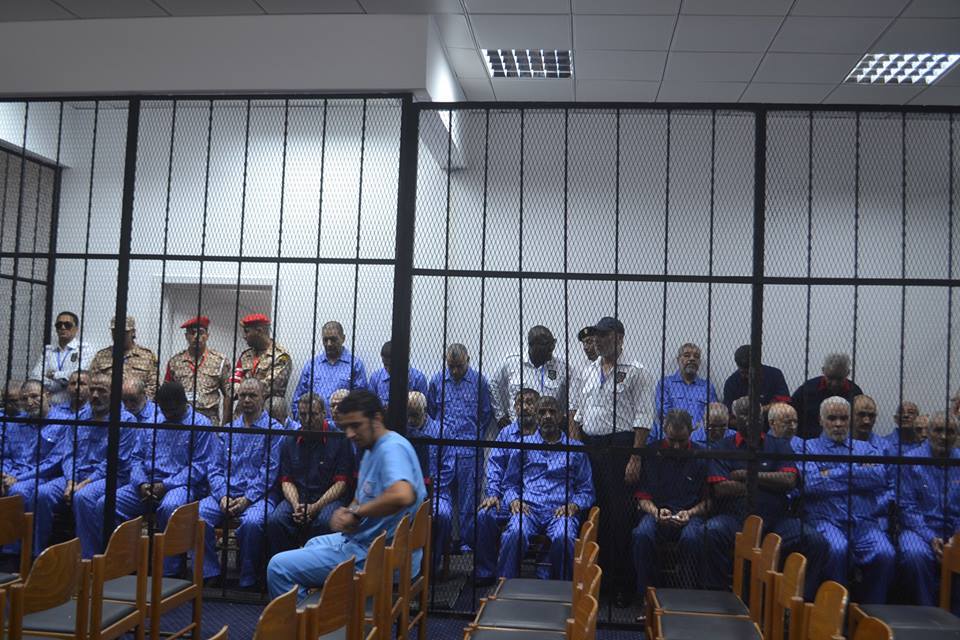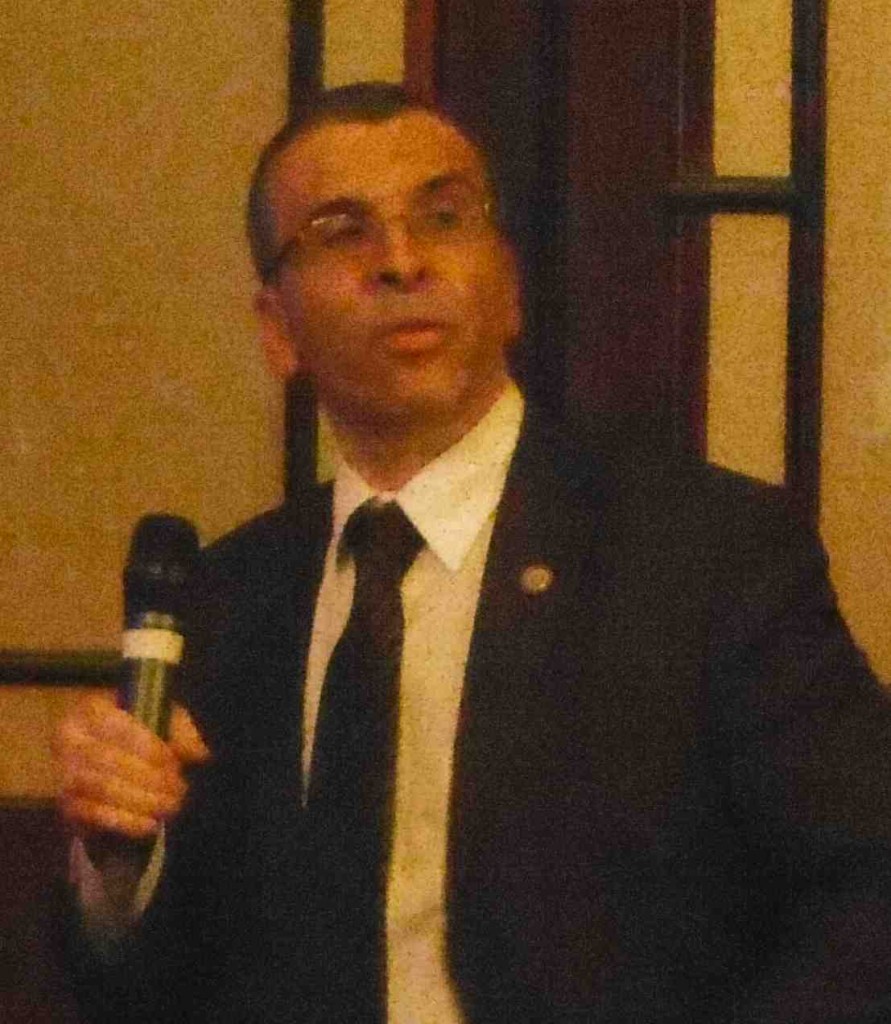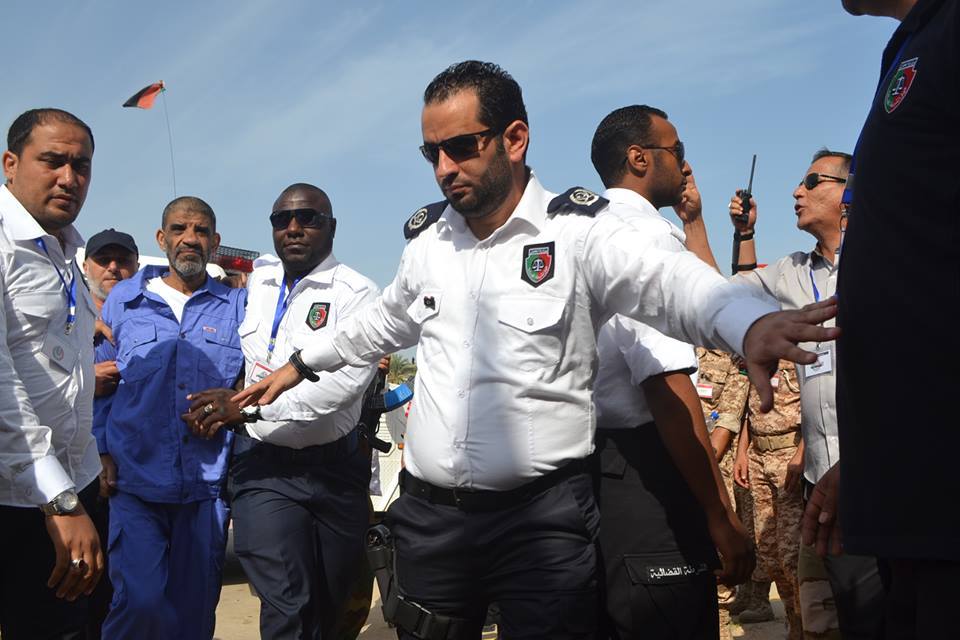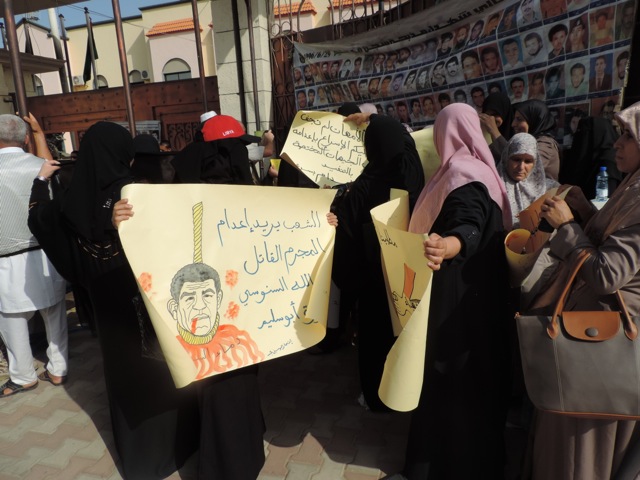Abdullah Senussi charged in Tripoli court; Saif still in Zintan
By Ashraf Abdul-Wahab and Ahmed Elumami.
Tripoli, 19 September 2013:
Abdullah Senussi, Qaddafi’s intelligence chief and brother-in-law, made his first appearance in court in Tripoli today to face charges of murder, conspiracy to murder and human rights crimes during the revolution, along with 36 other former regime defendants.
Saif Al-Islam Qaddafi, however, did not join Senussi in the court despite an announcement yesterday from the Attorney General that, along with orders to various towns to hand over their former regime prisoners, he had ordered Zintan to send Qaddafi’s son to Tripoli this morning. Earlier reports today that it had done so were mistaken.
Instead Saif Al-Islam made a separate court appearance this morning in Zintan on the lesser charges of trying to escape.
The Tripoli hearing was largely concerned with the formalities of establishing charges and identities. Along with Senussi who looked thin and gaunt, appearing to confirm his doctor’s claim that he has prostate cancer, the 36 accused appearing today included Qaddafi’s External Security Agency head Abu Zaid Omar Dorda, former Foreign Minister Abdul Ati El-Obaidi, the General People’s Conference head Mohamed Al-Zway, former Prime Minister Al-Baghdadi Al-Mahmoudi, and Tripoli Internal Security Agency head Mansour Dhou.
Unlike Senussi, Dorda, Obaidi and Zway have already made court appearances in Tripoli. Dorda’s case was adjourned on several occasions while Obeidi and Zway, who were arrested in July 2011, were found not guilty in June on charges of maladministration while in office and wasting public funds.
Proceedings against Mansour Dhou, captured in Sirte by Misratan forces on 20 October 2011, first opened in Misrata two months ago when he was charged, among other things, with employing foreign mercenaries to set up rocket launchers to attack NATO aircraft. He was transferred to Tripoli this morning, in compliance with the Attorney-General’s request.

Defendants in the trial include Abu Zaid Omar Dorda, Abdul Ati El-Obaidi, Mohamed Al-Zway, Al-Baghdadi Al-Mahmoudi and Mansour Dhou
At the end of two hours today, during which the defendants confirmed their names and the charges against them were read out, the pre-trial hearing was adjourned until 3 October. By then, the judge and his deputy ordered, defence lawyers must have reviewed their clients’ files and prepared their defences.
The proceedings were watched by a handful of foreign press reporters alongside local print and media journalists. Outside the court, there was a small protest by families of Busleem prison massacre victims, many with placards demanding that Senussi and others be hanged. Security was high both inside and outside the courtroom, with local shops being asked to close up.
Before it was adjourned, a member of the Attorney-General’s office, Sadiq Al-Sour, told the Tripoli court that Saif had not been brought from Zintan for “some security reasons”.
He added that the head of Ministry Justice Penal Institutions in Zintan was to be asked about Saif’s absence, given that prisons in Misrata, Benghazi, Sebha and Zawia had complied with the Attorney-General’s instructions and had delivered to the court the suspects they were holding.
Yesterday, the Attorney General’s office said it had issued orders to bring 38 defendants from Qaddafi’s regime including Saif Islam Qaddafi to Tripoli to appear in court today.
The Attorney General himself, Abdulaqader Jumaa Radwani, said that there were 4,000 pages of accusations against the 38 defendants, supported by some 40,000 other documents.
Meanwhile in Zintan, Saif made his third court appearance on charges relating to his alleged attempt to escape and endangering national security. For the first time, he had two lawyers, one appointed by the court, the second appointed by his relatives, although exactly who is unknown.
Speaking in court, he said he wanted the trial to be in Zintan, not in Tripoli.
His lawyers asked for more time to read charges, check the evidence and build up his defence. Accepting the plea, the judge adjourned the case until 12 December.
Before doing so, however, he called for Saif’s ICC Australian lawyer, Melinda Taylor, and her Lebanese translator, Helene Assaf, to show themselves to the court. They, along with two other ICC officials were held for nearly a month last summer after Taylor was accused of passing secret documents to Saif.
It is not clear at this point if the court wants them merely to give evidence or if they are now being formally charged in absentia on the same charges as Saif. Officials in Zintan had already indicted that they planned to charge Taylor and Assaf, although the ICC’s local representative, Dr Fadi El-Abdallah, has pointed out that any such proceedings would be illegal because they had immunity.
Senussi and Saif are both wanted by the International Criminal Court (ICC) in The Hague. In the case of Saif, the Libyan authorities filed a case in May last year at the ICC to prosecute him in Libya. It was told it could postpone handing him over until the ICC made its decision. At the end of May this year, the ICC judges rejected the application and told the Libyan authorities that they were obliged to hand him over.
To coincide with Libyan plans to charge Saif Al-Islam today with murder and other crimes, Human Rights Watch issued its own demand that he be surrendered to the ICC.
“Carrying on with a domestic proceeding against Saif Gaddafi in the face of an ICC order to turn him over to The Hague is a serious misstep,” said Richard Dicker, international justice director at Human Rights Watch. “Libya assured the UN Security Council it would cooperate with the court, and it needs to turn Saif Qaddafi over to The Hague without any more delay.”
The reality, however, is regardless of whether or not it wants to send him to The Hague, the Libyan government is powerless to do so at present, given that Zintan refuses to surrender him.
Senussi does not, as yet, have to be surrendered to the ICC while a Libyan appeal to allow him to be tried in Libya is heard by the judges in The Hague. However, it has said that, whatever the outcome of any trial in Tripoli against him, Libya must hand him over if it rules, as it did with Saif, that he must be sent for trial in The Hague.
With input from Aimen Eljali
Zintan refuses to hand over Saif for Tripoli pre-trial
By Ahmed Elumami and Tom Westcott.
Tripoli, 18 September 2013:
Qaddafi’s son Saif Al-Islam will not be attending a planned pre-trial court hearing in Tripoli tomorrow, according to a senior Zintan official.
“Saif will not be handed over to Tripoli,” spokesperson for Zintan Local Council Omar Matooq told the Libya Herald, “he will be tried in Zintan.”
Saif, Qaddafi-era spy chief Abdullah Senussi, and 20 other senior Qaddafi officials were due to attend a pre-trial hearing tomorrow, with Saif and Senussi facing charges of crimes against humanity.
Zintani officials have consistently denied that Saif would be handed over but, a week ago, Justice Minister Salah Al-Marghani told the Libya Herald that as far as he was concerned all defendants would be present at tomorrow’s hearing.
It is not yet clear whether Zintan is holding the equivalent pre-trial hearing tomorrow or at a later date. A separate case brought against Saif, charging him with trying to escape and insulting the Libyan flag, was also due to be heard tomorrow.
Matooq said that a meeting was being held in Zintan to decide whether or not media would be able to attend Saif’s forthcoming court cases. Journalists were present at Saif’s May court appearance in Zintan.
Oil blockage lifting ......
Oil production to hit 700,000 b/d by Friday: NOC board member
By Nigel Ash

NOC board member Mustafa Sanalla speaking in London today (photo: Nigel Ash, Libya Herald)
London, 17 September 2013:
As strikers permit the resumption of work at oil fields and export terminals Libya oil production, already back to 243,000 barrels a day will have risen to 700,000 b/d by Friday, a senior NOC executive said today in London.
Speaking on the sidelines of the FDI Libya conference Mustafa Sanalla, an executive board member of the NOC board said that production was now flowing from Al-Sharara and El-Fil (Elephant) fields. “I believe that it will be to 700,000 barrels by Friday” he said and put in a call to his Tripoli office to confirm that figures.
He said that Force Majeure had been partially lifted on export contracts and export terminals were now working. Earlier in the day when Prime Minister Ali Zeidan had spoken to the conference, he said that the disruptions had been costing Libya $130 million a day.
Sanalla also outlined NOC’s plans to spend $60 billion over the next six years on new and upgraded refining capacity, raising product capacity from the current 380,000 to 1 million barrels a day.
He said it was absurd that the country was importing 80 percent of its petrol, 40 percent of its diesel and 25 percent of its LPG. He said that he thought that it was likely that the first expansion would take place at the Zawia refinery.
Libya committed to its contracts despite oil strikes – NOC chairman Berruien
By Sami Zaptia.
Tripoli, 18 September 2013:
Speaking yesterday at the opening of the CWC Libya Forum on oil and gas, NOC chairman Nurri Berruien, referring to the oil stoppages that have crippled Libya’s oil production, said that he was “very confident that we will soon overcome these problems and hiccups”.
The NOC chairman further added, addressing the audience made up of sponsors such as ENI, OMV, Repsol, Oxy, RWE, Schlumberger and others that he would like to “assured ” them that Libya was “committed to its contracts despite events”, referring to the oil strikes.
Trying to find a silver lining in the midst of the worse production crises in Libya’s oil sector since production was returned to pre revolution days, Berruien said that since last year’s conference Libya had made a few oil and gas discoveries and that it was in the process of updating the EPSA model and oil law.
Berruien admitted that Libya’s aging oilfields discovered in the mid-1960’s needed upgrading and that its existing refineries also needed upgrading. He also said that Libya needed to build new increased refining capacity. He estimated that this would need an estimated investment of over US$ 60 billion over 6 years probably funded by the NOC.
The NOC chairman also saw opportunities for other refineries and petrochemical projects that could be funded by the private sector.
He also stressed that despite the security situation, that exploration has continued with neary 50 wells being drilled in the last year.
Berruien stressed that the NOC wanted to train local staff to take them up to international standards. He also said that they were dealing with war damage to the environment which he thought would need huge finance and expertise to implement.
There will be minimal damage to oil reservoirs – NOC chairman Berruien
By Sami Zaptia.
Tipoli, 18 September 2013:
Asked by the media about any possible damage to oilfields and oil reservoirs as a result of the strikes that have reduced Libyan oil production from 1.5 million barrels per day (bpd) to about 250,000 bpd, NOC chairman Nurri Berruien said that it would be minimal.
The NOC chairman, speaking during the CWC Libya Forum on oil and gas said that the stoppage would “off course have its effect on the oil fields and reservoirs”, but added that “it would not be like the effect of the stoppage during the revolution”.
“The main impact will be cost”, he quickly added during question and answer section of the morning opening session.


No comments:
Post a Comment